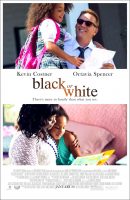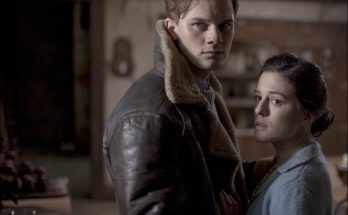Tagline: There’s more to family than what you see.
The story of a grandfather (Academy Award winner Kevin Costner) who is suddenly left to care for his beloved granddaughter. When her paternal grandmother (Academy Award winner Octavia Spencer) seeks custody with the help of her brother (Anthony Mackie), the little girl is torn between two families who love her deeply. With the best intentions at heart, both families fight for what they feel is right and are soon forced to confront their true feelings about race, forgiveness, and understanding. Anchored by an all-star cast and based on real events, the movie is a look at two seemingly different worlds, in which nothing is as simple as black or white.
Black or White is an American drama film directed and written by Mike Binder. The film stars Kevin Costner, Octavia Spencer, Gillian Jacobs, Jennifer Ehle, Anthony Mackie and Bill Burr. The film premiered at the 2014 Toronto International Film Festival and was released in the United States on January 30, 2015.
Director’s Statement
In light of recent events, it’s become clear that there very much exists a racial divide in this country. When I began writing the script for Black or White, the attention around race issues in America was certainly prominent and very much a motivating factor in my desire to tell this story. But in the time since, it seems that we have moved into new territory around this topic and the thematic elements within Black or White have become timelier than anyone could have predicted when the idea for this story was born.
I realize it sounds cliche, but in so many instances, it seems that we continue to only see each other for how we appear on the surface instead of for who we really are inside. Not too long ago, I was struck by the words of President Barack Obama on the night that he spoke publicly about the verdict in the Trayvon Martin case.
He said, “We have to figure out a way to get past this divide.” But it was after this statement, when he noted that the thing he was most optimistic about was that his daughters are better at it than he is, and that really resonated with me. I also have two children, and they too are better at it than I am. They don’t see people for color or for sexual identity, they see people as people.
Black or White is inspired by a situation in my own life. Several years ago, my wife’s sister passed away at 33. She had a seven-year old son, who is biracial. His father is out of the picture, but his father’s family lives in South Central, Los Angeles; they are terrific and very involved in his life. But my wife and I, along with several members of her family- as well as several members of his father’s family- all ended up raising him together.
In many ways, he grew up in two completely different worlds: Santa Monica and South Central. He was a happy kid and everyone else made a much bigger deal out of the fact that he is half white and half black. But when we’d make the trip to South Central to drop him off for a weekend or pick him up, I would be reminded of just how drastically different every little thing was from our home in Santa Monica. Fortunately, they didn’t have a problem with us; his grandmother loved my wife, Diane. But I imagine that if something happened to Diane, I don’t think they’d be so happy with just me raising him.

Production Information
In Black or White, no one is easily pegged as a hero or a villain. It’s a rousing story of two sides of a family whose best protective impulses might just prevent them from seeing what a child needs most. “People who see this film will have no choice but to feel something and to have strong opinions,” says Andre Holland (Selma), who plays Eloise’s father, Reggie. “This movie will definitely start conversations and bring up some potent feelings. I think that’s what art is supposed to do-help us see each other in different ways.”
Elliott believes his granddaughter is best off in his protected world. He can’t see what she might be missing. “The world Rowena provides is a world that Elliott doesn’t completely understand,” says Costner. “He’s just afraid of it, afraid of South Central. He knows his own world and he thinks his fence and his alarms will keep [Eloise] safe.”
It’s a battle, of wills-a battle over what makes a family-that will leave audiences moved, says Spencer. “Whether you’re with Elliott and against Rowena, or if you’re with Rowena and against Elliott, by the end of the movie, if you can’t find your way to the middle, there’s something wrong.”
Black or White was inspired by writer-director Mike Binder’s own family, in which his wife’s sister died, leaving a seven-year-old, biracial boy without parents. Binder and his wife, Diane, and one of her brothers stepped in to help raise the child, bringing him from their Santa Monica home to his estranged father’s family in South Central, Los Angeles for weekend visits. Binder was struck by the dramatic differences between the two worlds, as well as by the families’ similarities. “I wanted to do a piece about where we go forward in racial relations in this country,” he says. “I wanted us to have a conversation.”
Binder reached out early to Costner. He’d been sending the actor scripts ever since they first collaborated on 2005’s The Upside of Anger. “He’s so prolific as a writer,” says Costner. “All the scripts were good, and they kind of smelled like me. [But] they were all near-misses for me.”
The actor passed on every one, until Black or White. “I was taken with the first page of the script,” he says. “I was emotional, and that’s hard to do-to do emotion off of a page in a script and to do so early on in a script. A lot of times you can build something to the point where you’re terribly moved, but Mike’s writing was very precise.”
When the movie opens, it’s the darkest day of Elliott’s life: he has just learned of his wife’s death in a car crash. Costner was impressed by how Binder used this crushing event to gradually reveal the story. “The onion begins to peel back,” he says, “and he goes home to an empty house. Only it’s not empty. Inside is a little girl, a black child. And you’re thinking, ‘What movie am I in?’ Mike keeps us right on the edge.”
And yet even a captivating script by a proven screenwriter is not necessarily enough to attract the financing needed to produce a film. “It was clear to me that the movie wasn’t going to be made,” says Costner. “And it wasn’t going to be made because its value was being questioned overseas. That irritated me because I feel this movie is very commercial. I feel it represents all the ideas that we love about cinema and touches those notes beautifully.”
So Costner stepped in to help finance Black or White himself, a move he hasn’t made on a film he’s starring in since 1990’s Dances with Wolves. “Those people out there who are looking for movies [to finance] should have been running towards this movie, but they weren’t.” He also brought on executive producer Cassian Elwes (Dallas Buyers Club). “Kevin is such a good barometer for himself of the types of movies that work for him,” says Elwes. “Reading the script, you could just see him in it, and knowing what he would bring to the table would just elevate the movie.”
By being involved as a producer, Costner ensured that key moments in the script were not lost. “I have done this before in my career and I felt Black or White was worth doing, and I’d do it again. For me, it was easy to see this as a movie, and easy to see audiences watching this in the dark.”
Black or White debuted to a standing ovation at the 2014 Toronto International Film Festival. And that was the beginning of Binder’s hoped-for conversation about family, race, and the willful blindness that can stop us from seeing our own failings. “There aren’t too many movies with a story that forces you to think,” says Anthony Mackie (The Hurt Locker), who plays Jeremiah, Rowena’s brother, a lawyer who represents her case in court by pushing his sister to aggressively take Elliot down. “What Mike has given us is a three-dimensional story with three-dimensional characters.”
Black or White is anchored by three exceptional leading performances: Costner, who has never been in finer form; Spencer, who commands attention in every frame; and Estell, who at seven years old gives a dazzling big-screen debut. “Jillian Estell managed to come in here and really hold this movie together with a nuanced performance,” says Estell’s leading man, Costner.
“We saw a lot of tape and we narrowed it down to three girls,” says Producer Todd Lewis. “We had, I believe, two of them read with Kevin. And Jillian just knocked it out of the park. The rest was pretty easy.”
Binder is a veteran screenwriter and stand-up comedian whose two careers blossomed simultaneously. In March of 1990, his first produced screenplay, Coupe de Ville, made it to theaters. That same month, Binder’s stand-up special debuted on HBO (his acting career developed in the years that followed). Binder’s writing for movies and television has always straddled the genres of comedy and drama, from his HBO series “Mind of a Married Man” to the films The Upside of Anger and Reign Over Me, he has explored such themes as masculinity, grief and rage, while never allowing his stories to get too bogged down in grave territory.
“Mike has this way of telling real-life stories and you’re getting a lesson but you don’t realize it,” says Spencer. “And you’re enjoying yourself, but it really makes you ponder or assess yourself.”
Black or White
Directed by: Mike Binder
Starring: Kevin Costner, Octavia Spencer, Gillian Jacobs, André Holland, Anthony Mackie, Jennifer Ehle, Paula Newsome, Indigo, Joe Chrest, Janeline Hayes
Screenplay by: Mike Binder
Production Design by: Christian Wintter
Cinematography by: Russ T. Alsobrook
Film Editing by: Roger Nygard
Costume Design by: Claire Breaux
Music by: Terence Blanchard
MPAA Rating: PG-13 on appeal for brief strong language, thematic material involving drug use and drinking, and for a fight.
Studio: Relativity Media
Release Date: January 30, 2015
Visits: 98








